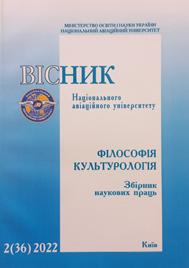“CHALLENGE AND RESPONSE” CATEGORIES AS A REFLECTION OF THE SITUATION OF A “HISTORICAL TURN”: SEARCHING FOR A “NEW NORMALITY” AND NEGATIVE TRENDS OF MODERN CIVILIZATION
DOI:
https://doi.org/10.18372/2412-2157.36.16976Keywords:
historical turning point, new normality, globalization, world order, Western democracy and liberalism, post-democracy, challenge and response, story, philosophy of history, dystopia, post-truth, disinformation, world crisis, civilizationAbstract
Introduction. In thepaper, we turn to the "call and response" theory proposed by the historian Arnold J. Toynbee for a philosophical
understanding of historical research. The aim is to analyze the Western discourse of the current situation. The tasks. An attempt is made to
extrapolate the category of “challenge” to the historical situation of the “turning point”, which world leaders announce, and to trace the negative
trends of the liberal world order, including through the prism of the dystopian predictions of George Orwelland Aldous Huxley. Research
results. The future has contradictory trends: it may lead to a deepening of the global crisis or a “big reset” of the system of values and priorities
in all spheres of life. The modern historical process is characterized by the economy as a "systemic crisis of capitalism". From the side of
geopolitics as "the crisis of the Western liberal model of the world order" and "the end of globalization". On the political side, the crisis is
characterized by post-democracy, mediocracy, and post-truth. On the social side, it is characterized by a crisis of labor institutions and the
“social contract”, an increase in injustice and endemic poverty, etc. All of the above indicates a fundamental change in the way of life of people,
in which there is social and moral segregation of people, the philosophy and practice of etatism, and global corporatism. Discussion. More and
more comparisons are being made between the tendencies of modern history and the gloomy plots of well-known anti-utopian works by
A. Huxley and J. Orwell. According to A. Huxley, changes in politics and the economy do not lead to the formation of a “brave new world”. The
most important revolution is being carried out by the forces of biology, psychology, and pedagogy since implementing a “Brave new world”
requires a new person. To stay in a stable globally centralized world, a person must primarily change bodily-anthropologically, morallypsychologically,
and ideologically. Modern trends in the culture of entertainment and consumption have the same goals as the "One State" plans
from A. Huxley's utopia. Conclusion. Although the probability of the predictions of A. Huxley and G. Orwell are growing humanity still retains
room for maneuvering and for a productive creative "response". The “Great Reset”, outlined by the elites, additionally proves that there is a
search for new concepts and algorithms. But at the same time, this indicates that the elites also lack the resources to bring a totalitarian utopia
closer. A. Huxley concluded his preface by defining three paths of development: global supranational totalitarianism in the spirit of utopia,
national tyranny, and militarism, or the third path of "common sense". History is again at the crossroads of serious alternatives, and again
humanity needs to pass an exam for its historical and cultural maturity.
References
Ernst Ulrich von Weizsäcker, Anders Wijkman. 2018. Come on! Capitalism, Short-termism, Population and Destruction of the Planet. A Report to the Club of Rome. Springer Science+Business Media LLC.
Klaus Schwab. Global Corporate Citizenship: Working With Governments and Civil Society. Foreign Affairs, Vol. 87, No. 1 (Jan. - Feb, 2008), pp. 107-118.
Mark Leonard. The decline and fall of Davos man / The European Council on Foreign Relations. Commentary 31 May 2022. https://ecfr.eu/article/the-decline-and-fall-of-davos-man/
Schwab Klaus, Malleret Thierry. Covid-19: the great reset. Forumpublishing 2020.
Seaton Jean, Crook Tim, Taylor D.J. Welcome to dystopia – George Orwell experts on Donald Trump. The Guardian 25 Jan 2017. https://www.theguardian.com/commentisfree/2017/jan/25/georgeorwell-donald-trump-kellyanne-conway-1984
Sustainable Development The Challenge of Transition. / Editors: Jurgen Schmandt, Austin C. H. Ward. April 2000, 240 p.
Ward Marguerite. The founder of the World Economic Forum explains why 'a new mindset' is giving him hope for climate action, and shares which companies are getting it right Insider Apr 22, 2021 https://www.businessinsider.com/wef-chief-klaus-schwab-bill-gatesright-about-climate-change-2021-4
Гегель Г. Феноменология духа. Философия истории. М. : Эксмо, 2007. 880 с.
Капурро Р. Информационная этика. Информационное общество. 2010. Вып. 5. С. 6-15 http://emag.iis.ru/arc/infosoc/emag.nsf/BPA/7c972fbe98fca119c32577dc0036bb4f
Киссинджер Г. Мировой порядок». Москва: АСТ, 2015.
Колин Крауч. (2010) Постдемократия. М.: Высшая Школа Экономики (Государственный Университет). 192 с.
Тойнбі, Арнольд. Дослідження історії. Том 1 / пер з англ. В. Шовкуна. К.: Основи, 1995. 614 с.
Фукуяма Ф. Конец истории? Вопросы философии. 1990. № 3. С. 134–148.
Хаксли О. О, дивный новый мир / пер. с англ. СПб.: Амфора, 1999. 541 с.
Шоріна Т. Г. Постправда як реальність девальвованої культури в епоху кризи сучасної демократії. Вісник Національного авіаційного університету. Серія: Філософія. Культурологія. Т. 31 (1), 2020. С. 114-121. https://doi.org/ 10.18372/2412-2157.31.14838.


